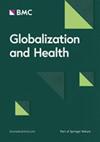世卫组织牵头的控制温室气体排放全球战略:行动呼吁
IF 5.9
2区 医学
Q1 PUBLIC, ENVIRONMENTAL & OCCUPATIONAL HEALTH
引用次数: 0
摘要
人为温室气体排放导致的气候变化是人类健康面临的最大威胁之一。世界卫生组织(WHO)领导全球努力应对新出现的公共健康威胁,包括控制烟草、酒精、铅和石棉等有害物质,取得了显著的健康成果。尽管世卫组织就气候变化带来的巨大且日益增长的健康风险发出了明确的信息,但温室气体尚未被归类为有害物质,需要通过全球战略或框架进行控制。此外,尽管气候变化在全球范围内造成了严重的、可预防的健康风险,但世卫组织尚未将因气候变化造成的疾病列为国际关注的公共卫生紧急事件(PHEIC)。一些历史先例为世卫组织宣布过量温室气体为健康危害奠定了基础,其中包括对臭氧消耗物质和母乳替代品的控制,控制的公共利益超过了颁布这些物质的潜在利益。此外,世卫组织在《国际卫生条例》中承诺保护全球健康,因此必须宣布气候变化为 PHEIC,世卫组织总干事特德罗斯-阿达诺姆-格布雷耶苏斯(Tedros Adhanom Ghebreyesus)宣布:"气候危机是一场健康危机:世卫组织总干事特德罗斯-阿达诺姆-格布雷耶苏斯宣布:"气候危机是一场卫生危机,它助长了疾病的爆发,导致非传染性疾病的发病率上升,并有可能使我们的卫生队伍和卫生基础设施不堪重负"。重要的是,卫生部门也许比其他部门更能成功地克服巨大的既得利益,消除这些对健康的威胁。因此,世卫组织必须充分利用其公信力和影响力,通过宣布过量温室气体排放为有害物质和宣布气候变化为PHEIC,建立控制温室气体的全球框架。还有谁比世卫组织更有能力推动必要的重大社会变革,以确保一个宜居的未来?本文章由计算机程序翻译,如有差异,请以英文原文为准。
A WHO-led global strategy to control greenhouse gas emissions: a call for action
Climate change, driven by anthropogenic greenhouse gas emissions, is among the greatest threats to human health. The World Health Organisation (WHO), has led global efforts to respond to emerging public health threats including the control of hazardous substances such as tobacco, alcohol, lead and asbestos, with remarkable health gains. Despite WHO’s clear messaging on the enormous and growing health risks of climate change, greenhouse gases are not yet classified as hazardous substances, requiring control through a global strategy or framework. Additionally, WHO has not classified disease attributable to climate change as a result of the promulgation of these hazards as a Public Health Emergency of International Concern (PHEIC), despite the serious and preventable health risks it poses globally. Several historical precedents set the stage for WHO to declare excess greenhouse gases as health hazards, including the control of ozone-depleting substances and breast-milk substitutes where the public benefit of control exceeded the potential benefit of their promulgation. In addition, WHO’s undertaking within the International Health Regulations to protect global health, providing imperative to declare climate change a PHEIC, with Tedros Adhanom Ghebreyesus, director-general of WHO, declaring: “The climate crisis is a health crisis, fuelling outbreaks, contributing to higher rates of noncommunicable diseases, and threatening to overwhelm our health workforce and health infrastructure”. Importantly, the health sector, perhaps more than other sectors, has successfully overcome formidable, vested interests in combatting these threats to health. It is thus imperative that WHO make full use of their credibility and influence to establish a global framework for the control of greenhouse gases through the declaration of excess greenhouse gas emissions as a hazardous substance, and declaring climate change a PHEIC. Who else is better placed to drive the considerable societal transformation needed to secure a liveable future?
求助全文
通过发布文献求助,成功后即可免费获取论文全文。
去求助
来源期刊

Globalization and Health
PUBLIC, ENVIRONMENTAL & OCCUPATIONAL HEALTH-
CiteScore
18.40
自引率
1.90%
发文量
93
期刊介绍:
"Globalization and Health" is a pioneering transdisciplinary journal dedicated to situating public health and well-being within the dynamic forces of global development. The journal is committed to publishing high-quality, original research that explores the impact of globalization processes on global public health. This includes examining how globalization influences health systems and the social, economic, commercial, and political determinants of health.
The journal welcomes contributions from various disciplines, including policy, health systems, political economy, international relations, and community perspectives. While single-country studies are accepted, they must emphasize global/globalization mechanisms and their relevance to global-level policy discourse and decision-making.
 求助内容:
求助内容: 应助结果提醒方式:
应助结果提醒方式:


